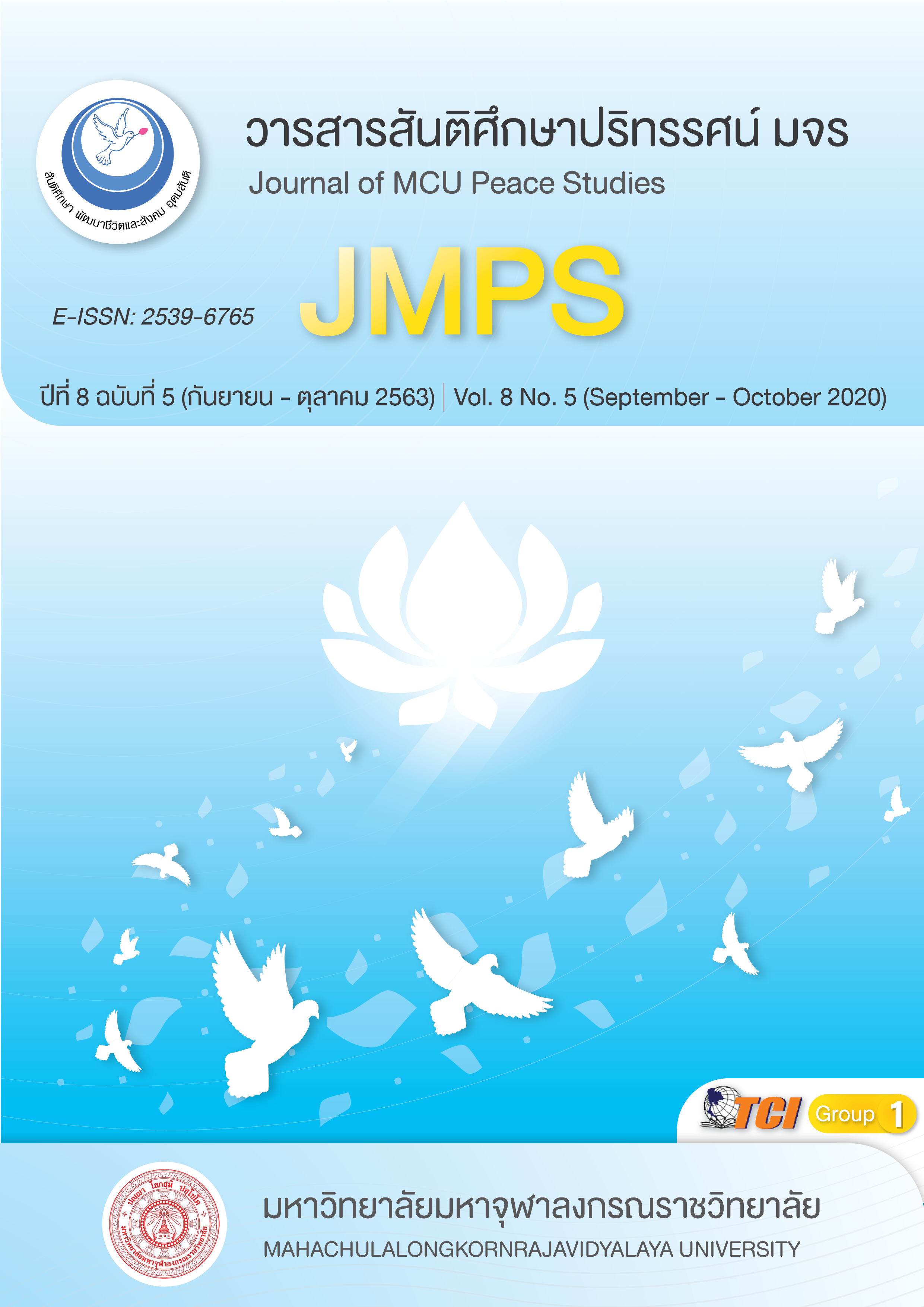การพัฒนาการบริหารจัดการด้านการเงินของวัดไทยตามหลักสันติธรรมาภิบาล: ศึกษากรณีวัดท่าคอยนาง อำเภอปรางค์กู่ จังหวัดศรีสะเกษ
Main Article Content
บทคัดย่อ
บทความนี้เพื่อศึกษา 1) สถานการณ์ปัจจุบัน และปัญหาการจัดการการเงินของวัดไทย 2) การจัดการการเงินวัดตามหลักสันติธรรมาภิบาลในพระพุทธศาสนาเถรวาท 3) นำเสนอการพัฒนาการบริหารจัดการด้านการเงินตามหลักสันติธรรมาภิบาลของวัดท่าคอยนาง เป็นการวิจัยเชิงคุณภาพ โดยเก็บข้อมูลเชิงเอกสารและเชิงพื้นที่ การสัมภาษณ์เชิงลึก 20 รูป/คน ได้แก่ เจ้าอาวาส 5 รูป นักวิชาการและคณาจารย์ 5 คน พระสงฆ์/คณาจารย์ของมหาวิทยาลัย 4 รูป/คน นักวิชาการสำนักงานพระพุทธศาสนาแห่งชาติ 3 คน และผู้บริหารของธนาคารกรุงไทย 3 คน และการสนทนากลุ่มย่อย ผลการวิจัยพบว่า 1) การจัดการการเงินของวัด ส่วนมากไม่มีโครงสร้างในการบริหารการเงิน การจัดทำรายงานไม่เป็นไปตามหลักมาตรฐานบัญชี ไม่มีการตรวจสอบจากผู้สอบบัญชี การเผยแพร่ข้อมูลทางการเงินของวัดมีน้อย ไม่มีการรวบรวมข้อมูลอย่างเป็นระบบ บุคลากรยังขาดความรู้ความเข้าใจที่ถูกต้องเกี่ยวกับการบริหารจัดการที่ดี และหลักการบริหารการเงินของผู้มีอำนาจหรือผู้ที่ได้รับมอบหมายให้ดำเนินการ 2) การบริหารจัดการด้านการเงินตามหลักสันติธรรมาภิบาลของวัดท่าคอยนาง มี 5 ด้าน คือ 5 P’s Peace Finance Model ได้แก่ Peace person (ผู้ที่เกี่ยวข้องและคุณสมบัติ) Peace management (การบริหารการเงินของวัด) Peace principle (หลักธรรม) Peace law (การปฏิบัติตามกฎกระทรวง) และ Peace governance (หลักสันติธรรมาภิบาล) 3) การพัฒนาการบริหารจัดการการเงินของวัดท่าคอยนาง ในรูปแบบ QR Codee-Donation โดยมีการจัดทำบัญชีรับ-จ่าย มี 4 ประเภท คือ การบริหารจัดการสมุดบัญชีเงินสดย่อย การบริหารจัดการบัญชีเงินสดรับ-จ่าย การบริหารจัดการสมุดบัญชีรายรับ และการบริหารจัดการสมุดบัญชีรายจ่าย
Article Details
ทัศนะและความคิดเห็นที่ปรากฏในบทความในวารสาร ถือเป็นความรับผิดชอบของผู้เขียนบทความนั้น และไม่ถือเป็นทัศนะและความรับผิดชอบของกองบรรณาธิการ ยินยอมว่าบทความเป็นลิขสิทธิ์ของวารสาร
เอกสารอ้างอิง
Apaipak, P. (2018). The Guidelines for Prevention and Suppression of the Corruption in the Government Agencies. Chandrakasem Rajabhat University Journal of Graduate School, 13(1), 2-12.
Chunsom, N. (2012). Buddhist Thai Temples’ Financial Management (Research Report). Research Center: National Institute of Development Administration.
________. (2014). Buddhist Thai Temples’ Financial Management: The Congruence of Good Governance Principles. NIDA Development Journal, 54(1), 107-141.
Junsontima, K. (2018). The Study of Participation in Administration of the Temple s Religious Property Using Civil State Model (Research report). Research and Development Office: King Prajadhipok's Institute.
Khaosod Online. 2019. Buddhist bureau reveals survey results of Buddhist monks and novices drastically reduced to 2.5 thousand nationwide. Retrieved March 5, 2020. from https://www.khaosod.co.th/ around-thailand/news_2957304.
Krivas, K., & Natsrit, E. (2019). The Good Governance in Finance and Fiscal Management of Goverment. Suvarnabhumi Institute of Technology, 5(1), 138-148.
Phramaha Sunan Ruchiwet. (2014). Development of Model for Religious Property Management of Monasteries in Ayutthaya Province. (Doctoral Dissertation). Graduate School: Mahachulalongkornrajavidyalaya University. Ayutthaya.
Phramaha Winai Champsaythong. (nd). School Administration according to Rajadhamma X and Good Governance. Mahamakut Graduate School Journal, 16(1), 194-203.
Phrarajvorametee (Veera Vorapanyo). (2016). The Model of Leadership According to Buddhism
of Administrators in Buddhist University of Thailand. Journal of MCU Social Science review, 5(1), 1-16.
National Office of Buddhism. (2019). Wat total summary report. Retrieved March 5, 2020. from http://www3.onab.go.th/2019/02/12/wattotalsummaryreport31012562/.
UNESCAP. (2013). What is a good governance?. Retrieved March 6, 2020 from http://www. unescap.org/pdd/prs/ProjectActivities/Ongoing/gg/governance.asp.
Wongpanya, T. (2018). The Standard. Retrieved March 6, 2020 from https://the standard.co /head-of-monks-corruption/.
Thaipost online. (2019). Judge change the temple, the first case, the court ordered 26 years “Prakru Kitti” prison to join “Nopparat” money laundering, Buddhist Bureau. Retrieved March 6, 2020 from https://www.thaipost.net/main/.


